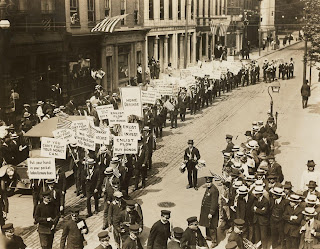This week, the USA and UK are kind of celebrating the end of the pandemic, in their respective countries. America has allowed people not to wear masks, both outdoors and indoors, provided one is fully vaccinated. However, since vaccination doesn’t create a visible tattoo for others to see, the maskless mingling is based on trust. In Britain, since yesterday, people are madly hugging, a revenge for year-long missed hugs.
In Brazil and India, systems are overwhelmed and
broken. Far more patients than hospital beds. Far more bodies than pyres at the
crematorium.
*****
When will the pandemic end, I mean truly end in the
whole world and not specific parts of it? The 1918 Spanish flu pandemic may
offer some lessons.
Laura Spinney, the author of Pale Rider: The Spanish Flu of 1918 and How It Changed the World lives
in France. In France, she says, there are 170,000 monuments to World War I, but
not a single one to the pandemic. Despite the pandemic killing 50-100 million
globally, many more than the world war. Wars produce enough material for
novels, films, have good and evil, and plenty of human drama. (Think Mahabharata or War and Peace). Spanish flu apparently produced fewer stories. In
that book, the author says that wars destroy both infrastructure and people.
Pandemic usually kills only people, so it is easier to rebound once it is over.
Covid-19 Pandemic has offered enough human stories, I
think. Not having experienced a world war, for most people this is the first
experience of a global shock.
*****
One key difference is that in 1918, infectious
diseases were the major killer anyway. Until last year, cancer or heart disease
is what would kill modern people. Alzheimer’s worries people more than measles.
The other thing is the 2020 media: Television and
internet have ensured everyone in the world fully understands the global nature
of the pandemic. One hundred years ago, in the absence of visual media, the perceived
impact was essentially local.
*****
John Barry wrote: The
Great Influenza: The Story of the Deadliest Pandemic in History.
He says the 1918 pandemic began in spring, with its
first wave not deadlier than influenza. A more contagious and more lethal
variant caused the deadly second wave. Then it also seemed to disappear. In
March 1919, another variant triggered a third wave less deadly than the second,
but more lethal than seasonal flu. First wave illness protected against the
second wave (meaning people who were infected in the first wave were spared in
the second). But neither the first nor second wave infections could protect
against the variant in the third wave. In the absence of vaccines, the immune
system of the survivors kept improving, and turned the virus into an ordinary
seasonal flu virus.
That is expected to be the best case scenario this
time as well. Coronavirus turning into an annual flu-like virus that kills, but
doesn’t require any lockdowns.
*****
As far as society was concerned, in the USA, only
during the second wave were schools, theatres and salons shut. Masks were introduced.
One big difference was the duration of the restrictions and lockdowns. The 1918
disease usually affected a given community for 6 to 8 weeks, and restrictions
lasted 3-5 weeks. The working people’s behavior didn’t alter significantly.
This time, the world has accepted the Zoom way of
working, and at least partially it is likely to remain longer than the virus.
Spanish flu was more active in winters. That had
triggered a naïve hope of safety in summers. Brazil and India have shown there
is no real correlation this time.
On 28 September 1918, Philadelphia organized the
Liberty Loan parade to celebrate the soldiers returning from the WW.
Intellectuals opposed that gathering. Ignoring them, the patriotic event
gathered 200,000 people. Within the next few days, 47,000 fresh cases were
reported and 12,000 people died. The second wave was particularly deadly for
the 25-35 year olds.
The world would be a better place if Presidents and
Prime Ministers were students of history.
Ravi

हो ना आपल्या कडे बंगालमध्ये किती वेडेपणा केला.कुंभमेळ्याबद्दल तर बोलायलाच नको
ReplyDeleteI agree with your last sentence absolutely! And it is definitely not over yet!
ReplyDelete